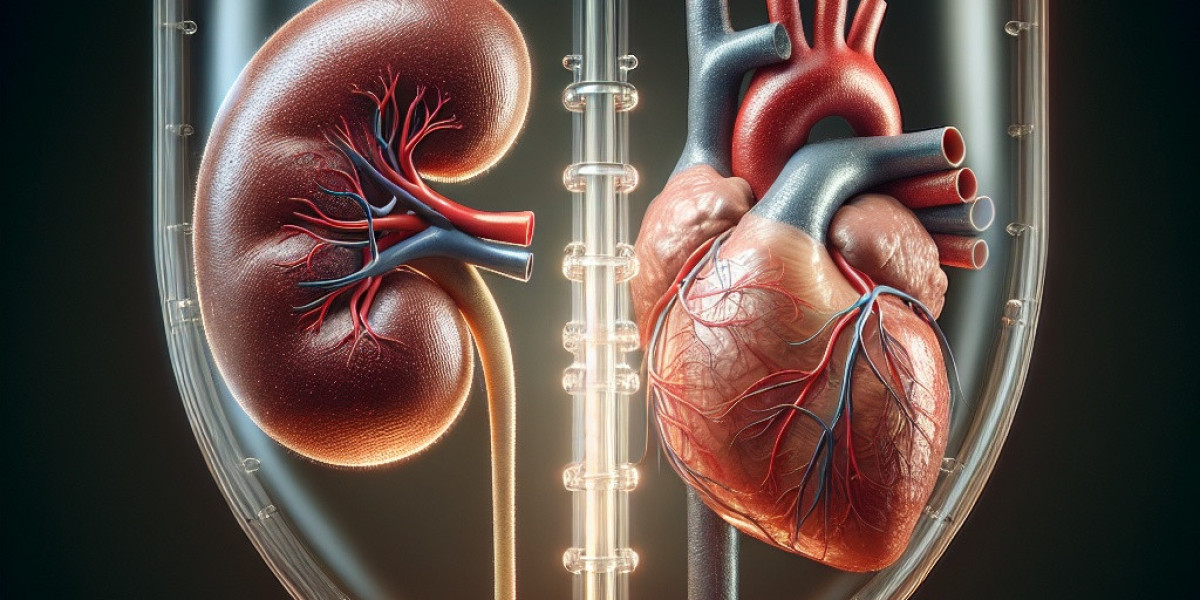The heart and kidneys are two of the body's most essential organs, and their health is closely intertwined. When one of these organs is compromised, it often affects the other. Heart disease can lead to kidney damage, while kidney disease can strain the heart, creating a cycle of worsening health. Given their close relationship, it becomes crucial to protect both organs to ensure overall wellness. This guide highlights practical tips for maintaining the health of both the heart and kidneys.
The Heart-Kidney Connection
The heart pumps oxygen-rich blood throughout the body, supplying every organ with the nutrients it needs to function. The kidneys, on the other hand, filter the blood, removing waste and excess fluids to maintain balance. However, when one organ is not functioning well, it directly impacts the other. This is where conditions like cardiorenal syndrome come into play, where heart disease contributes to kidney issues, and vice versa.
High blood pressure, one of the leading causes of cardiovascular and kidney problems, can damage blood vessels, including those that supply the heart and kidneys. Additionally, chronic conditions like diabetes exacerbate this damage, leading to long-term complications.
Understanding this intricate relationship emphasizes the importance of maintaining the health of both organs. The following tips focus on promoting dual organ health to prevent future complications.
1. Managing Blood Pressure
High blood pressure is a significant risk factor for heart and kidney disease. When blood pressure remains elevated, it damages the blood vessels in both organs, potentially leading to chronic illness. Maintaining blood pressure within a healthy range is essential for keeping both organs functioning at their best.
Effective ways to control blood pressure:
Regularly monitor blood pressure, particularly for those with a family history of hypertension.
Reduce sodium intake. Excess salt causes the body to retain fluids, raising blood pressure.
Incorporate regular physical activity to lower blood pressure and support cardiovascular health.
Avoid smoking and excessive alcohol consumption, both of which raise blood pressure levels.
2. Following a Heart-Healthy Diet
A diet that supports cardiovascular health will also benefit the kidneys. Consuming a balanced, nutrient-rich diet helps control cholesterol, maintain healthy blood pressure, and support an optimal weight, all critical factors for protecting the heart and kidneys.
Key dietary recommendations:
Include plenty of fruits and vegetables, which are rich in antioxidants, vitamins, and minerals that support overall health.
Choose whole grains like brown rice, oats, and quinoa to improve digestive health and reduce cholesterol levels.
Choose lean protein sources such as fish, poultry, and plant-based proteins over red or processed meats.
Incorporate healthy fats, such as those found in olive oil, nuts, seeds, and fish.
Foods to limit:
Excessive sugar, can contribute to weight gain and increase the risk of diabetes.
High-sodium processed foods, raise blood pressure and strain the kidneys.
3. Staying Hydrated
Adequate hydration is crucial for kidney function, as water helps the kidneys filter waste and maintain electrolyte balance. Dehydration can lead to kidney stones and impair kidney function over time, putting additional stress on the heart as well.
Tips for staying well-hydrated:
Aim to consume around 2 liters of water each day, adjusting for activity level and weather conditions.
Drink more water during periods of exercise or hot weather to prevent dehydration.
Minimize the intake of sugary drinks like sodas and energy drinks, which can increase the risk of heart disease and diabetes.
4. Engaging in Regular Exercise
Physical activity is a cornerstone of both heart and kidney health. Regular exercise strengthens the cardiovascular system, improves circulation, and aids in maintaining a healthy weight, all of which contribute to the proper functioning of both organs.
Exercise recommendations:
Aim for at least 150 minutes of moderate aerobic exercise weekly, such as brisk walking, swimming, or cycling.
Include strength training exercises twice a week to build muscle and support metabolic health.
Incorporate simple ways to stay active throughout the day, like taking the stairs or walking during breaks.
5. Controlling Blood Sugar Levels
Diabetes is a leading cause of both heart and kidney disease. Elevated blood sugar levels damage blood vessels and can severely impair kidney function over time. Controlling blood sugar levels is vital for protecting both organs.
Ways to manage blood sugar:
Monitor blood sugar levels regularly, especially for those with a history of diabetes.
Eat balanced meals that include lean proteins, whole grains, and healthy fats to avoid spikes in blood sugar.
Limit sugary snacks and beverages.
Work with healthcare professionals to manage diabetes, including medication if necessary.
6. Limiting Alcohol and Quitting Smoking
Excessive alcohol consumption and smoking are harmful to both heart and kidney health. Alcohol raises blood pressure and can contribute to heart disease, while smoking damages blood vessels, limiting the effectiveness of the heart and kidneys.
Steps to minimize risk:
Limit alcohol consumption to moderate levels, no more than one drink per day for women and two for men.
Seek support for smoking cessation. Various options are available, including nicotine replacement therapy and counseling services.
7. Monitoring Kidney Function
Regular checkups are crucial for early detection of kidney problems, particularly for those at higher risk due to conditions like diabetes, hypertension, or a family history of kidney disease. Routine tests can provide valuable insight into kidney health and detect issues before they progress.
Tests to monitor kidney health:
eGFR (estimated glomerular filtration rate): A key measure of how well the kidneys filter blood.
Urinalysis: A simple test that checks for signs of kidney damage, such as the presence of protein or blood in the urine.
Creatinine levels: A waste product that, when elevated in the blood, signals impaired kidney function.
8. Getting Enough Sleep
Quality sleep is vital for overall well-being, and it has a significant impact on heart and kidney health. Poor sleep patterns are linked to high blood pressure, heart disease, and decreased kidney function.








